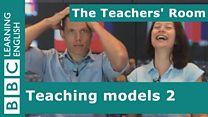Unit 22: English You Need
Exams, news, pronunciation, teachers' tips, learners' questions
Select a unit
- 1 English You Need
- 2 English You Need
- 3 English You Need
- 4 English You Need
- 5 English You Need
- 6 English You Need
- 7 English You Need
- 8 English You Need
- 9 English You Need
- 10 English You Need
- 11 English You Need
- 12 English You Need
- 13 English You Need
- 14 English You Need
- 15 English You Need
- 16 English You Need
- 17 English You Need
- 18 English You Need
- 19 English You Need
- 20 English You Need
- 21 English You Need
- 22 English You Need
- 23 English You Need
- 24 English You Need
- 25 English You Need
- 26 English You Need
- 27 English You Need
- 28 English You Need
- 29 English You Need
- 30 English You Need
Session 4
Welcome to The Teachers’ Room. The show all about teaching practice. Grab a cup of coffee, pull up an armchair and relax. Learn something new, remember something fundamental or just have a giggle.
Activity 1
The Teachers' Room
Three essential speaking sub-skills
Dan and Sian talk about 3 speaking sub-skills that all students should know
Watch the video and complete the activity

___________________________________________________________________
Did you like that? Why not try these?
____________________________________________________________________________________
Sub-skills
The skill of speaking can be broken down into sub-skills. These have a range of functions, but we have chosen three that we believe are the most important due to being the most widely used.
Clarifying and checking understanding
If students can’t ensure that they have fully understood what is being said, then they could misunderstand, which could have consequences.
This skill uses phrases such as: I’m sorry, could you repeat that? or Are you saying that…
To practise, put the students in pairs and have a short conversation on a topic of your / their choice. Get one of the students to cover their mouth with their hand, making them difficult to understand. Have the other student listen and check and clarify. Then this second student reports back to the class – and the original student confirms or rejects what they have said.
Giving opinions, agreeing and disagreeing
This sub-skill involves students expressing what they think – something they are likely to have to do in any number of situations.
This skill uses phrases such as: In my opinion… or Yes, you have a point… or I’m sorry, I don’t see things that way…
Play Black and Red. Take a pack of cards and write a list of arguing topics on the board. One for every number type in the deck. Then put students in pairs (or small groups) and have them take a card each. The first student’s card designates the topic, on which they must express an opinion. Their partner must agree (red) or disagree (black) based on the colour of their card. They must justify it too!
Circumlocution
This is when a student ‘talks around’ a vocabulary gap to make themselves understood. It helps them communicate ‘above their level’ since the listener supplies the missing item – whether a concrete noun or an abstract concept.
This skill uses phrases such as: It looks like a… or It means something like…
Play Taboo to practise this. Prepare some cards with a head word (the target) and some related words. Students must describe the word to their team without saying any words from the card
To do
Try our quiz to see if you've picked up our tips.
The Teachers' Room Quiz
4 Questions
Check what you've learned by selecting the correct answer to each question.
Help
Activity
Check what you've learned by selecting the correct answer to each question.
Hint
Speaking can be broken down into sub-skills, which represent how to achieve different speaking aims. Does this apply to the other skills? Do we always read, listen and write in the same way?Question 1 of 4
Help
Activity
Check what you've learned by selecting the correct answer to each question.
Hint
In order to practise this sub-skill students must encounter some resistance to their spoken communication.Question 2 of 4
Help
Activity
Check what you've learned by selecting the correct answer to each question.
Hint
In it's simplest form, this activity relies on students being told that they have to either agree, or disagree. They need something to indicate which one they must do.Question 3 of 4
Help
Activity
Check what you've learned by selecting the correct answer to each question.
Hint
Taboo is a game where students are given words on cards. Circumlocution is about not knowing the word for something. Are these two ideas compatible?Question 4 of 4
Excellent! Great job! Bad luck! You scored:
Get involved
Well, those were just a few ideas that we here at BBC Learning English had, but we know that you teachers out there have lots of fantastic ideas too, and we’d like you to share them with us and everybody else.
If you have a great tip or technique for teaching speaking, or anything else, please email us at learningenglish@bbc.co.uk. Your email could be posted here on this page, or may even be mentioned in our show.
We are also looking for video tips to include in the programme. You could be rewarded with a T-shirt for your efforts.
End of Session 4
Next up is Learners' Questions. What will this week's Learner Question be? Whatever it is, Dan's here with the answer! Join us in Session 5 to find out.
Session Vocabulary
Three essential speaking sub-skills
- Clarifying and checking understanding
- Stating opinion, agreeing and disagreeing
- Circumlocution


